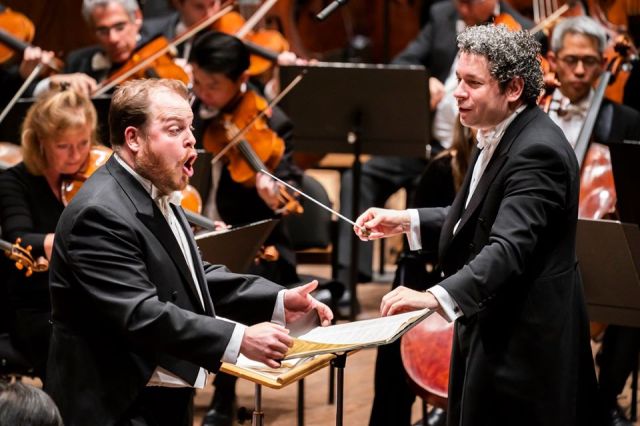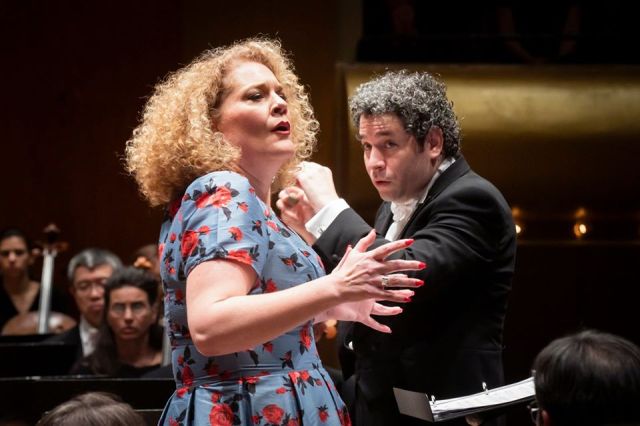New York Philharmonic
Gustavo Dudamel, conductor
Michelle DeYoung, mezzo-soprano
Andrew Staples, tenor
David Geffen Hall
Lincoln Center
New York, NY
January 23, 2020
Schubert: Symphony No. 4 in C minor, D417, Tragic
Mahler: Das Lied von der Erde
Not having had a New York Philharmonic appearance since 2009, Gustavo Dudamel made an eagerly anticipated return in a two week stint, the second of which coupled an early symphony by Schubert with a late work of Mahler. While Schubert’s Fourth Symphony may seem like a trifle in the wake of Mahler’s Das Lied von der Erde, it too is a canvas of deep poignancy, often befitting of its sobriquet Tragic – not in the least during the opening of gripping Beethovenian pathos.

Dudamel allowed for the introduction to be spacious and breathable, and the movement proper was of pointed dynamic contrasts. He took matters at a noticeably slow tempo in spite of the Allegro vivace indication – while perhaps this served to amass gravitas, to my mind it felt unnecessarily plodding as a dirge. The orchestra on stage was quite large for Schubert, but clarity was maintained with the delicate inner voices never lost in the masses.
The Andante came as a more gentle foil, this gem of a slow movement boasting a lieder-like intimacy and a particularly fine oboe solo. What followed was a propellant Menuetto, with its trio a rather more halcyon affair. The Allegro finale returned to the pathos of the opening, with Dudamel saving the brisker firepower for the end. Lyrical interjections from the winds offered some respite, but matters were generally tightly wound and with sharp articulations by the strings, rounded off by a driving trio of chords.
Deborah Borda, the Philharmonic’s president and CEO, took to the stage to announce that Simon O’Neill, the previously scheduled tenor, was indisposed and would be replaced by Andrew Staples. Fresh off playing the role of Andres at the Met’s well-regarded run of Wozzeck, Staples hardly sounded as a mere stand-in, handily overcoming Mahler’s substantial technical demands. In its large-scale conception, rallying two singers and massive orchestra, Das Lied von der Erde is perhaps the non plus ultra of the song cycle, a venerable form with modest beginnings in Beethoven’s An die ferne Geliebte – by happy coincidence, heard the previous night at 92Y.
The opening “Das Trinklied vom Jammer der Erde” was of brassy energy and of a certain epic quality despite being a rather mundane drinking song. Staples had no issue projecting over the surging passions of the orchestra, and each intonation of “Dunkel ist das Leben, ist der Tod!” was increasingly pained. The interludes for orchestra alone were consistently highlights, often appropriating the pentatonic scale to invoke a certain orientalism. “Der Einsame im Herbst” turned inwards to the forlorn and pensive, beautifully captured by the frosty tone of masterful Mahlerian Michelle DeYoung.
“Von der Jugend”, the most patently pentatonic, was a burst of youthful nonchalance, a marked departure from the weight of the bulk of the work. Sparkling orchestrations gave an appealing sheen to “Von der Schönheit”, and a more agitated section arrived on cue with the text’s depiction of lads arriving on horses; a genial orchestral postlude closed. Staples’ final contribution came in “Der Trunkene im Frühling” – another drinking song – given haughtily, but portrayal of the twittering birds in the violins added a layer of fragility.
The closing “Der Abschied”, clocking in at the length of the previous five songs combined, was nothing short of extraordinary. Its otherworldly beginnings and striking timbres – of harps, celesta, and sinuous oboe – brought to mind Stefan George’s line “Ich fühle luft von anderem planeten”, written virtually contemporaneously with Das Lied von der Erde. DeYoung had a full, resounding tone, but in equal measure delicate and fragile, as if hanging on to these last embers of earthly life. Dudamel offered a keen sense of direction for the long-form trajectory, and the orchestral transition between the two poems that comprise this final movement was deeply moving. After the arduous journey, the musings landed on the repeated incantation of “ewig, ewig”, a heavenly drifting away, to which the audience responded with perhaps the greatest praise of all: a full minute of reverential silence.

